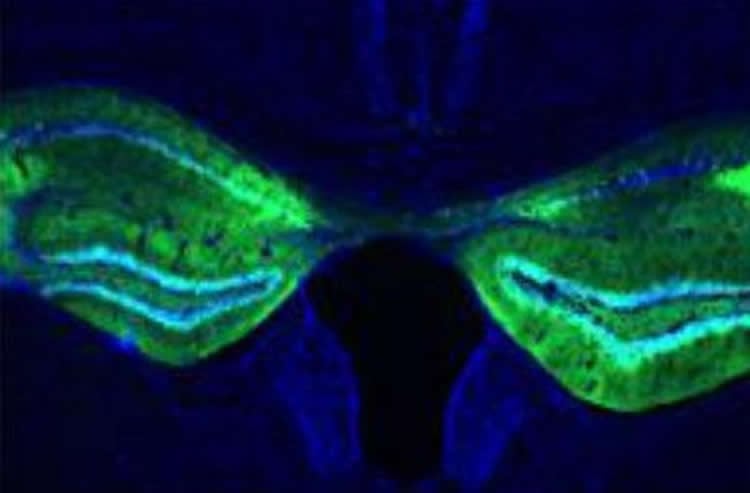Summary: Researchers report Metformin, one of the most widely prescribed drugs for diabetes, helped reduce symptoms associated with nicotine withdrawal in animal models.
Source: University of Pennsylvania.
Metformin, the most widely used medication for diabetes, has also been shown to help treat dementia and some cancers. New research from the Perelman School of Medicine at the University of Pennsylvania and Johns Hopkins Medicine shows smoking cessation may be added to that list.
In a new study in the Proceedings of the National Academy of Sciences the research team found that after giving mice metformin the animals displayed reduced symptoms when going through nicotine withdrawal.
“Although we are just beginning to characterize this new role for metformin, our study suggests that the protein it acts on could be a new target for smoking cessation treatment,” said senior author Julie Blendy, PhD, a professor of Systems Pharmacology and Translational Therapeutics at Penn.
Cigarette smoking is the leading cause of preventable disease and death in the United States, with more people dying from nicotine addiction than any other preventable cause of death. Even though quitting smoking brings many health benefits, the abstinence rate remains low with current medications, likely because of an array of undesirable withdrawal symptoms.
Metformin has a variety of targets, one of which is a protein called AMPK. This study showed that the AMPK pathway in the hippocampus of the brain is activated following long-term use of nicotine. But, this heightened AMPK activity is rapidly reversed during nicotine withdrawal, which is associated with negative symptoms such as anxiety.
Increasing AMPK levels using metformin decreases anxiety following nicotine withdrawal in the mice. Anxiety was measured in two behavior tasks that are designed to trigger relevant behaviors and contrast the tendency for mice to explore or engage in social investigation against the anxiety-producing properties of novel objects in the cage (the marble burying test) or an open, brightly lit space (a novelty-induced decrease in eating test).

This study provides evidence of a direct effect of AMPK on nicotine withdrawal symptoms and suggests that activating AMPK in the brain could be a therapeutic target for smoking cessation. The authors say that the well-established safety profile of metformin for diabetes should hopefully encourage clinicians to translate these findings into clinical trials to improve sustained abstinence rates in ex-smokers.
As part of a collaborative effort, clinical researchers Rebecca Ashare, PhD, an assistant professor of Psychology in Psychiatry, and Robert Schnoll, PhD, an associate professor of Psychology in Psychiatry and director of the Center for Interdisciplinary Research on Nicotine Addiction, are studying the effects of metformin on smokers to see if it attenuates negative mood and cognitive deficits during withdrawal – symptoms known to be associated with the ability to quit. If the current trial suggests withdrawal symptoms can be reduced, a larger study would evaluate its effects on smoking cessation.
At present, little is known regarding the molecular targets of the AMPK pathway following chronic nicotine use withdrawal. In the future, studies are aimed at using novel molecular approaches to selectively delete AMPK in specific brain regions associated with nicotine dependence to better understand the functional role of this protein in addiction.
Funding: Julia K. Brynildsen, Bridgin G. Lee, Isaac J. Perron, Sunghee Jin, and Sangwon F. Kim are coauthors. This work was supported by the National Institutes of Health (T32-GM008076, R01 DA041180, DK084336) and a National Center for Advancing Translational Sciences Award (TL1TR000138). The clinical project is supported by a grant from the Commonwealth of Pennsylvania.
Source: Karen Kreeger – University of Pennsylvania
Publisher: Organized by NeuroscienceNews.com.
Image Source: NeuroscienceNews.com image is credited to Julie Blendy, Ph.D., Perelman School of Medicine, University of Pennsylvania; PNAS.
Original Research: Open access research for “Activation of AMPK by metformin improves withdrawal signs precipitated by nicotine withdrawal” by Julia K. Brynildsen, Bridgin G. Lee, Isaac J. Perron, Sunghee Jin, Sangwon F. Kim and Julie A. Blendy in PNAS. Published April 2 2018,
doi:10.1073/pnas.1707047115
[cbtabs][cbtab title=”MLA”]University of Pennsylvania “Widely Prescribed Diabetes Drug Improves Nicotine Withdrawal Symptoms: Mouse Study.” NeuroscienceNews. NeuroscienceNews, 12 April 2018.
<https://neurosciencenews.com/metformin-nicotine-withdrawal-8769/>.[/cbtab][cbtab title=”APA”]University of Pennsylvania (2018, April 12). Widely Prescribed Diabetes Drug Improves Nicotine Withdrawal Symptoms: Mouse Study. NeuroscienceNews. Retrieved April 12, 2018 from https://neurosciencenews.com/metformin-nicotine-withdrawal-8769/[/cbtab][cbtab title=”Chicago”]University of Pennsylvania “Widely Prescribed Diabetes Drug Improves Nicotine Withdrawal Symptoms: Mouse Study.” https://neurosciencenews.com/metformin-nicotine-withdrawal-8769/ (accessed April 12, 2018).[/cbtab][/cbtabs]
Abstract
Activation of AMPK by metformin improves withdrawal signs precipitated by nicotine withdrawal
Cigarette smoking is the leading cause of preventable disease and death in the United States, with more persons dying from nicotine addiction than any other preventable cause of death. Even though smoking cessation incurs multiple health benefits, the abstinence rate remains low with current medications. Here we show that the AMP-activated protein kinase (AMPK) pathway in the hippocampus is activated following chronic nicotine use, an effect that is rapidly reversed by nicotine withdrawal. Increasing pAMPK levels and, consequently, downstream AMPK signaling pharmacologically attenuate anxiety-like behavior following nicotine withdrawal. We show that metformin, a known AMPK activator in the periphery, reduces withdrawal symptoms through a mechanism dependent on the presence of the AMPKα subunits within the hippocampus. This study provides evidence of a direct effect of AMPK modulation on nicotine withdrawal symptoms and suggests central AMPK activation as a therapeutic target for smoking cessation.






